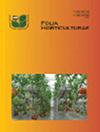Effect of foliar application of zinc on annual productivity, foliar nutrients, bioactive compounds and oxidative metabolism in pecan
IF 1.8
4区 农林科学
Q2 HORTICULTURE
引用次数: 1
Abstract
ABSTRACT Pecan nut production is quite commonly limited by zinc (Zn) deficiency. Here, we evaluate the response in terms of the concentrations of non-structural carbohydrates, yield components, foliar nutrient levels and oxidative metabolism in young ‘Western Schley’ pecan nut trees in response to foliar applications of 200 mg · L−1 of Zn as one of the following: ZnSO4, Zn-EDTA, ZnO nanoparticles (NPs) or the proprietary product ‘nitrazinc’ (NZN) (the control). Across two consecutive growing seasons, the spraying of Zn in these various forms helped maintain the foliar concentrations of non-structural carbohydrates, foliar nutrients (total-N, Ca2+ and Mg2+) and the kernel percentage of nuts. Likewise, trees sprayed with ZnSO4 maintained the concentrations of Zn in the leaflets across seasons. On the other hand, Zn-EDTA decreased the concentration of chlorophyll and total carotenoids. In general, leaflets treated with ZnSO4, Zn-EDTA and ZnO NPs reduced their oxidative metabolism. Sources of Zn – such as ZnSO4 – are commercially viable alternatives suitable for increasing the performance of some parameters associated with the yield and quality of nuts in pecan. It would be worthwhile to determine the optimal Zn dose rates for the various pecan cultivars in common use and also to increase our understanding of the physiological and biochemical changes associated with foliar Zn applications.叶面施锌对山核桃年生产力、叶面养分、生物活性物质和氧化代谢的影响
果胶的生产通常受到锌缺乏的限制。在这里,我们根据非结构碳水化合物的浓度、产量成分、叶片营养水平和氧化代谢来评估年轻的“西施利”山核桃树对200 mg·L−1锌的响应,锌是以下物质之一:ZnSO4、Zn-EDTA、ZnO纳米颗粒(NP)或专有产品“nitrazinc”(NZN)(对照)。在连续两个生长季节,以这些不同形式喷洒锌有助于保持非结构碳水化合物、叶面营养素(总氮、Ca2+和Mg2+)的叶面浓度和坚果的籽粒百分比。同样,喷洒ZnSO4的树木在不同季节保持小叶中的锌浓度。另一方面,Zn-EDTA降低了叶绿素和总类胡萝卜素的浓度。通常,用ZnSO4、Zn-EDTA和ZnO-NP处理的小叶降低了它们的氧化代谢。锌的来源,如ZnSO4,是商业上可行的替代品,适用于提高与山核桃坚果产量和质量相关的一些参数的性能。确定各种常用山核桃品种的最佳锌剂量率是有价值的,也有助于加深我们对与叶面施用锌相关的生理和生化变化的理解。
本文章由计算机程序翻译,如有差异,请以英文原文为准。
求助全文
约1分钟内获得全文
求助全文
来源期刊

Folia Horticulturae
Agricultural and Biological Sciences-Horticulture
CiteScore
3.40
自引率
0.00%
发文量
13
审稿时长
16 weeks
期刊介绍:
Folia Horticulturae is an international, scientific journal published in English. It covers a broad research spectrum of aspects related to horticultural science that are of interest to a wide scientific community and have an impact on progress in both basic and applied research carried out with the use of horticultural crops and their products. The journal’s aim is to disseminate recent findings and serve as a forum for presenting views as well as for discussing important problems and prospects of modern horticulture, particularly in relation to sustainable production of high yield and quality of horticultural products, including their impact on human health.
 求助内容:
求助内容: 应助结果提醒方式:
应助结果提醒方式:


